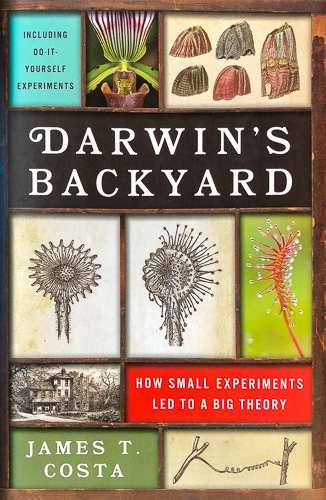
For many years, one of the many items on my list of books and articles I might one day write has been ‘Book about Charles Darwin’s experiments’. Now I know exactly how Darwin must have felt when he received Alfred Russel Wallace's bombshell letter: SCOOPED, DAMMIT!
The good news is I was right in thinking there was a fascinating book to be written about Darwin’s extensive, often eccentric, experiments. The even better news is that James T Costa has written that very book (and, I must begrudgingly concede, the result is far better than anything I might have come up with).
Darwin’s Backyard is highly readable, meticulously researched exploration of Charles Darwin the experimeter. With typical self-deprecating humour, Darwin famously remarked ‘I love fools’ experiments. I am always making them.’ This book describes Darwin’s long-term experimental research programme into such diverse topics as: barnacles, pigeons, honeycombs, the dispersal mechanisms of plants, the intelligence and actions of earthworms, insectivorous plants, pollination, flower morphology, and plant movement. This is a man who fed cheese to plants, who left dead birds floating in water for weeks on end, and who serenaded earthworms with bassoon and piano.
Costa is particularly good at explaining why Darwin’s often goofy-sounding experiments were anything but foolish. They all explored and supported his great theory of evolution by means of Natural Selection. Costa is also very good at explaining what Darwin got right, where he occasionally went wrong, and what we now know about the subjects under investigation. Each chapter ends with some suggestions for experiments you might like to try yourself.
My only trifling quibble with this book was its title and subtitle. In the UK, a ‘back yard’ is a small enclosed area at the back of a house, usually paved in cobblestones, concrete, or bricks. To refer to Darwin’s magnificent gardens at Down House in this way (and to keep referring to the autumn as ‘the fall’) was jarring for this British reader. The pedant in me would also take issue with the subtitle, ‘how small experiments led to a big theory’. While in some cases this might be true, I would suggest the reverse was true in many cases: it was Darwin's great theory that inspired his experiments—and many thousands of experiments since.
But trifling/pedantic quibbles aside, this is a fantastic book. Highly recommended.
- Buy this book from Bookshop.org (UK) and help tax-paying, independent bookshops.
- Buy this book from Amazon.co.uk
- Buy this book from Amazon.com